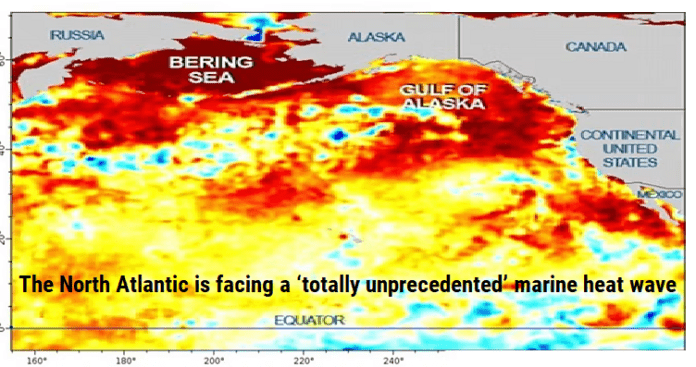The North Atlantic is currently experiencing a marine heat wave that is being described as “totally unprecedented.” This heat wave is causing soaring temperatures in parts of the North Atlantic Ocean, particularly off the coasts of the United Kingdom and Ireland . Sea temperatures in these areas are reaching extreme levels, with some regions experiencing water temperatures up to 5 degrees Celsius (9 degrees Fahrenheit) hotter than usual . This exceptional heat wave is raising concerns about its impacts on marine life and ecosystems in the region.
The intensity of this marine heat wave is reflected in its classification as a category 4 event, which is considered “extreme” by the National Oceanic and Atmospheric Administration (NOAA). Marine heatwaves are characterised as prolonged periods of anomalously warm ocean temperatures that can have serious consequences for marine biodiversity and ecosystems. In recent years, the frequency of marine heatwaves with notable ecological impacts has been increasing, and the number of marine heatwave days has risen by more than 50% in the last century.
The elevated temperatures observed in the North Atlantic are part of a broader pattern of exceptionally warm global oceans. April and May of this year recorded the highest ocean surface temperatures for those months since records began in 1850. These warmer oceanic conditions, coupled with long-term warming of the upper ocean, contribute to the occurrence and severity of marine heatwaves .
The impacts of marine heatwaves on marine ecosystems can be far-reaching. Such events can disrupt the ecological balance, damage coral reefs, alter species distributions, and even lead to mass die-offs of marine organisms. The North Atlantic marine heat wave poses a serious threat to species in the affected areas, particularly oysters and fish. The consequences of these heatwaves extend beyond immediate ecological disruptions and can have economic implications, especially for industries reliant on healthy marine ecosystems such as fisheries.
Understanding the drivers and impacts of marine heatwaves is a crucial area of research. Scientists are studying the physical processes that contribute to the occurrence of these events and how large-scale climate variability influences their likelihood and severity . As global sea surface temperatures continue to rise due to climate change, the frequency and intensity of marine heatwaves are projected to increase significantly in the coming decades. This underscores the importance of ongoing research and monitoring efforts to better comprehend the effects of ocean warming on marine life and ecosystems.







